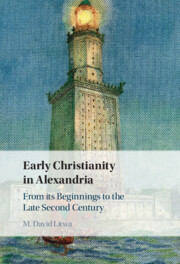Refine search
Actions for selected content:
2 results
Chapter 6 - Pythagoras
-
- Book:
- Ovid and Plato
- Published online:
- 19 June 2025
- Print publication:
- 03 July 2025, pp 92-113
-
- Chapter
- Export citation

Early Christianity in Alexandria
- From its Beginnings to the Late Second Century
-
- Published online:
- 14 December 2023
- Print publication:
- 21 December 2023
